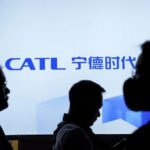March 26, 2025
Seoul – How to deal with the era of artificial intelligence has become a key topic in Korean politics, with potential presidential leaders proposing plans to address anxiety related to AI.
Former BJP former chairman Han Dong-Hoon gave a speech at a hotel in Seoul on Monday and said the change brought about by the looming AI Avalanche will sweep as much as the industrial revolution in the 19th century.
“The role of politics in the AI era is to address people’s anxiety about AI, such as the anxiety of using Deepfakes’ digital sex crime and automated takeover work,” he said.
Han also talked about using the drastic growth driven by change in AI leadership to expand welfare.
“We are a generation that will live through a period of great change. Experts say the new AI era will arrive in three to five years, which is a crucial time for South Korea to start investing in AI development,” Han told reporters. “If the industrial revolution is to overcome human physical strength, then the AI revolution will overcome the limitations of our intelligence.”
South Korea added that the United States and China have already participated in the AI battle.
“The U.S. has controlled exports of NVIDIA chips to China. AI technology may soon become valuable, just like strategic assets,” he said. “South Korea needs to start investing more in AI now.”
Rep. Lee Jae-Myung, Democratic Congressman of South Korea, met with Yuval Noah Harari, the author of Israel’s “Sapines: A Short History of Humanity” on Saturday and called for the reallocation of wealth accumulated by tech giants to address the income inequality that AI Dominance may bring.
“The other day, I suggested that the government acquire shares in AI companies and participate in the business and be attacked as a Communist Party,” the Democratic Party chairman said.
Li said a few companies “dominate the industry and monopolize wealth while aggravating inequality” is “very real concern.”
“In the end, there will be a worse world. How we overcome this AI-driven inequality and polarization will be a major challenge,” he said.
He recommends using state funds to invest in tech companies and redistribute profits into possible solutions.
Lee Kyoung-Jun, a professor of big data analytics at Kyung Hee University in Seoul, told the Korea Herald that leaders need to come up with policy solutions that support AI development, rather than limiting themselves to elections.
“Our politics should not only regard AI as a cool buzzword. The interest of our political leaders in AI is undoubtedly a good thing. But that interest must become a substantial policy,” he said.





